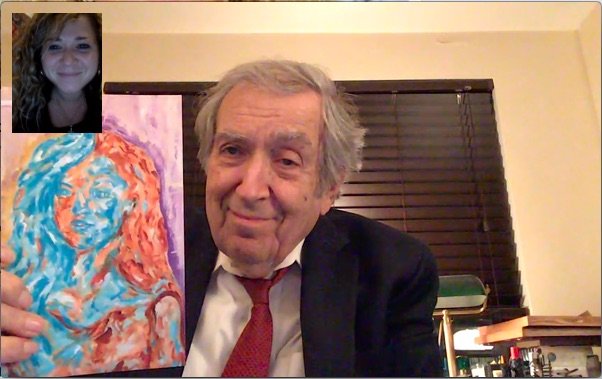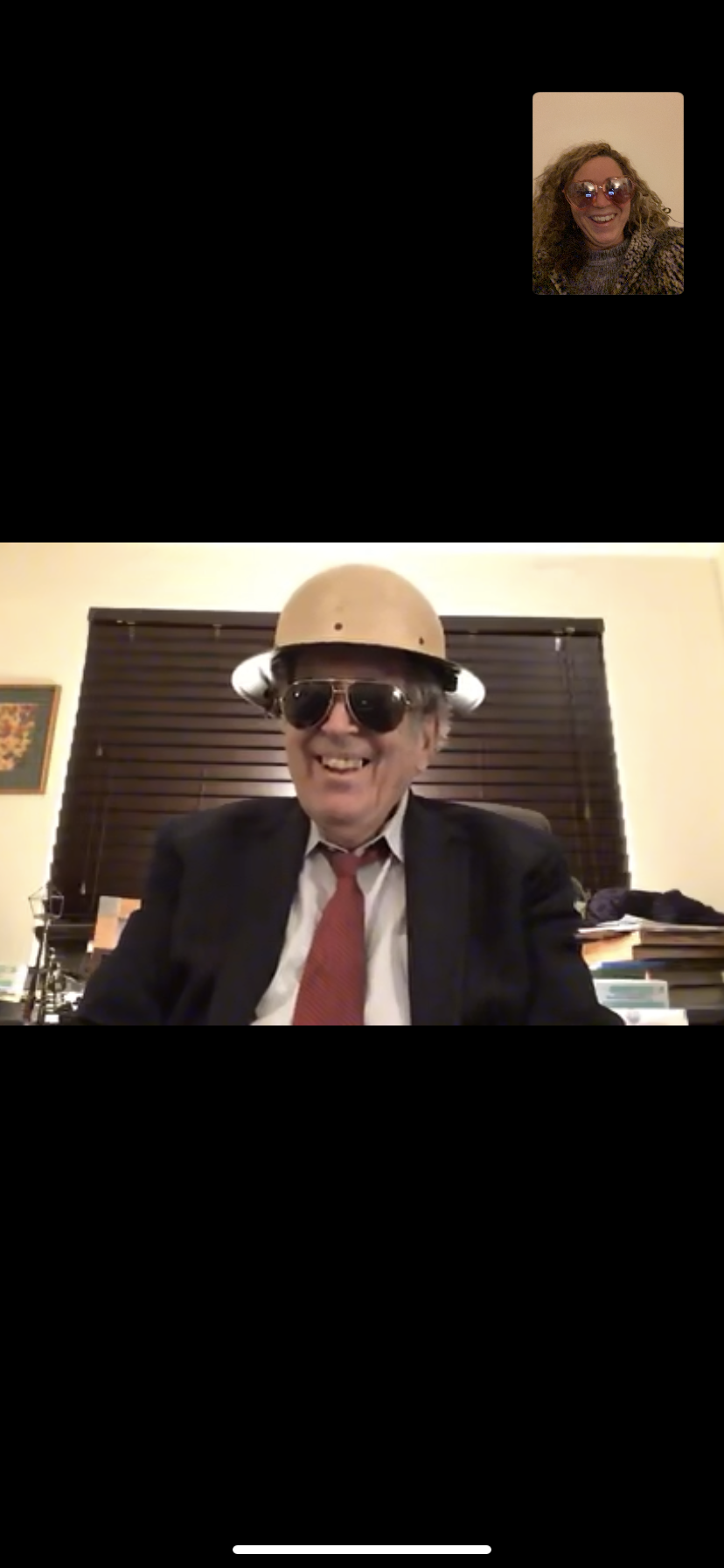My Therapist
Rest in power Dr. Edward Black, thank you.
Excerpt from the book, “The Aftermath of Unrest”
Meet Dr. Black. My therapist. To this day, he’s psychologically analyzed and vetted every single poem I’ve ever written.. What you don’t know is just how much fate played a role in the entire story of me, “DB,” and poetry.
Smack dab in the middle of my mental crisis, my coworker suggested that I try a therapy. I instantly rejected the idea. The thought of talking to a therapist had never crossed my mind. I didn’t think I would ever be in a place where I needed it, let alone, I had never imagined myself sitting across from someone while they analyzed my feelings. Yikes. The very idea terrified me and I had no idea what to expect, but at this point, I was out of options and I needed help.
The only problem? At the time, there were no available therapists in Manhattan. After all, it’s New York City. Everybody goes to therapy (which I didn’t realize until way later in my mental health journey). I downloaded Zoc Doc––an app that assists in finding doctors––and trolled every office in Manhattan with zero luck. It’s important to note that when it comes to therapy––it’s not just about finding any doctor willing to take you. You have to make sure it’s a good therapist. Someone that works for you. Why? There is nothing worse than a bad therapist––trust me, they can do much more harm than good.
Excuse my French, but I was shit out of luck. The process of finding a therapist is definitely not easy. Thankfully, the same coworker who suggested it in the first place, ended up offering me the number of hers. I had nothing to lose so, I called him immediately. After a few hours of phone tag, he finally got back to me, saying that I was “lucky because he usually has no openings.” By chance, or way of fate, he just so happened to have an available slot the next day.
Dr. Black’s office is exactly what I imagined it to be, as in, it’s the epitome of what a therapist’s office should look like. The layout is an old apartment that was converted into an office with a small, white room and a single hallway full of doors. The white room has a tiny seating area with a few chairs that line the perimeter. On one side of the room, there is a large painting of a vase full of pastel, oddly shaped flowers. Across from it is another painting of a meadow. Average, old school, doctor’s office decor. There are two coffee tables wedged between the chairs, stacked high with magazines and the other with old mail. The rug is Victorian style and runs around the room and down the hallway, stopping just before the door at the end. My guess is that it’s supposed to be bright and welcoming. It’s not.
When I walked in, I wasn’t sure if I had just entered a horror movie or a hallmark movie. It could’ve gone either way, really. I sat down in that chair, completely on fire and stared into the flower pot painting, trying to silence my chaotic thoughts. I was sitting on pins and needles, not cushions. The air felt thick and unbearable. The white walls melted together and blended into the carpet. The paintings morphed into giant smudges and the room became a whirling blur.
Dr. Black walked out, called my name, and I got up and followed him in. His actual office is a snap shot out of a movie set for Therapy 101. The room is dimly lit and accented with dark furniture. A massive mahogany book case covers the entire back wall. In front of it, a single black leather arm chair. It’s worn and clearly has been there for entirely too many years. That’s DB’s spot.
On the opposite wall, there’s the matching leather couch––equally as old and worn as its arm chair counterpart. A large picture frame that contains an image of cows on a hill hangs above it. Directly across from Dr. Black’s armchair, and diagonally facing the couch, is another leather chair with a single pillow. That’s my spot. The edges of the chair are picked away. The leather is tattered, probably from countless nervous people scratching at it as they work out their frustrations. To the left, there’s an odd lamp that looks as if it was made from human skin. (I wish I was kidding, I even asked him. For the record, it’s not.) Finally, in the back of the room, a wooden desk scattered with paperwork and pens.
In the first five minutes it was evidently clear how bad I was at “doing therapy.” So obvious, in fact, that after I finished talking, Dr. Black blinked and said, “You’ve never been to therapy before, have you?” To which I replied, “That obvious, huh?” The first session was a disaster. He reassured me that it takes a few times before it gets better, but I was totally out of my element. I left with racing thoughts, “This isn’t going to work” “This is stupid” “What does he know?” “I’m doomed.”
Something inside me told me to go back. So, I did.
The second time I went, I noticed he had no certificates or degrees. The walls in the room were lined with framed pictures of cows and landscapes photographs of Scotland. There were no credentials. No proof. This guy seemed like a total fraud.
I sat down and blurted out, “Are you even qualified???”
He laughed, “No, I’m just an old Jewish guy who sells sandwiches and you’re mashugana!”
I burst out laughing and dropped the act immediately. I felt comfortable. In turn, all of my problems started pouring out like a broken faucet. After that, therapy was a piece of cake.
A month or two went by and life was getting a little bit better with each passing day and every Monday evening session. A good therapist will get to the root of all anxieties, even the ones you’re not there for. That’s how poetry made its way into our conversations. On this particular day, my imposter’s syndrome was the topic of the hour.
He started joking about how I should write a book about therapy. I laughed it off and thought nothing of it, but when I left his office that day, an idea popped into my head. I wrote this:
My Therapist’s Fish
You’ve heard of the fly on the wall, but, have you ever thought about the fish in the room? I bet you haven’t. It’s a mindless subject, really. Nobody ever thinks about the fish. It’s just there.Floating around. Spitting bubbles into the water. But fish have ears, they have eyes, they have minds. They hear and see like the rest of us, but their knowledge is kept in utter silence. The fish in the room not only has its gills, it has your secrets too.
Inside The Bowl
The people in this room. They come and go, they talk. They flail their arms as the therapist bats his eyes. They grip the old leather arm chair and squirm in their seat. Each person is different than the next, but they’re all the same, really. They’re all troubled. They’re all lost in their minds, or losing their minds, rather. I hear and see it all. Trapped in my glass world.They fill my bowl with their secrets.Unaware of how their insanity is my entertainment.
The concept of an omniscient fish was hilarious. I giggled and bounced along, writing furiously as I walked down the street––totally distracted from my thoughts. In that moment, my mind was at peace. The only thing it could focus on was the fish in the room. I stopped dead in my tracks. The light-bulb went on. Writing is my remedy.
The following Monday, I burst into Dr. Black’s office.
“I decided to write a book of poetry!” I said matter-of-factly.
He blinked and after a long pause, asked, “Well... do you have any poems?”
“Yes.” I shot back.
Dr. Black raised his eyebrows and re-adjusted himself in his arm chair. He clasped his hands together and said bluntly, “…How can you write a book, if you won’t even share them with me?”
I thought about it for a minute. Weighed my options. Felt the anxiety bubble in my chest. Then, I concluded that if anyone was going to hear them…it would be my therapist. After all, it’s his job to listen to everything I say without judgment. I squirmed in my seat and picked at the armchair.
“You’re right.”
From that moment on, I started reading all my poetry to Dr. Black.
It ended up being that he had studied poetry for years prior to becoming a psychologist, and in the years following. He had an extremely vast knowledge of poetry. His feedback was valid, not only in the psychological context, but the actual literature too. What are the chances of that? There are thousands of therapists in New York City. Not a single one was available while I was searching. Quite frankly, he wasn’t either. Yet, I had just so happened to call on the right day at the right time. So tell me, what are the chances that the therapist I ended up with knew everything there was to know about poetry? How does that happen?
Fate. That’s how.
My poetic journey had started, even before I knew it. It started the moment I walked into therapy. I went back and forth about whether or not to keep the story about Dr. Black in this book. The decision to leave it in relied on two very important reasons:
1. The importance of therapy
2. Fate
Fate is very important. Some of you may not believe in it, but I’m here to tell you––fate is real. If you don’t believe me now, you will. Here’s the thing about fate:
If you try to fight it, it will fight back. If you try to run from it, it will chase you. But, if you welcome it––the outcome is always favorable.
See, fate only leads you in the direction in which you are meant to be traveling. Fate keeps you aligned with your purpose.
Very few people are lucky enough to have found their calling. Some of us are on the journey of discovering what it is or what it might be. Some of us are in the early stages of discovering what it even means to have a “purpose.” Others haven’t even begun the search. It doesn’t matter where you stand, what matters is knowing that fate will always step in to get you where you are meant to be. Or so, I like to believe.
There are many things in life we cannot explain, fate being one of them. If you think about it, most success stories somehow always have a common denominator. You guessed it! Fate. You hear things like “The stars aligned and I got the job of my dreams,” or “Everything fell into place and I bought my dream house,” or “I ran into someone by chance and they changed my whole life.” Those sentences are not rooted in coincidence. Each statement is just another way to say one thing: Fate swooped in to help guide you in the right direction.
There are no accidents. Everything happens for a reason.
Dr. Black was an incredible human. He had the gift of connecting with people at every level.
His existence changed so many lives. I know for a fact, it changed mine.
Thank you to Dr. Black for saving my life.
Believing in me.
And, always making me always feel like a famous poet.
Rest In Peace, may your legacy live forever.



